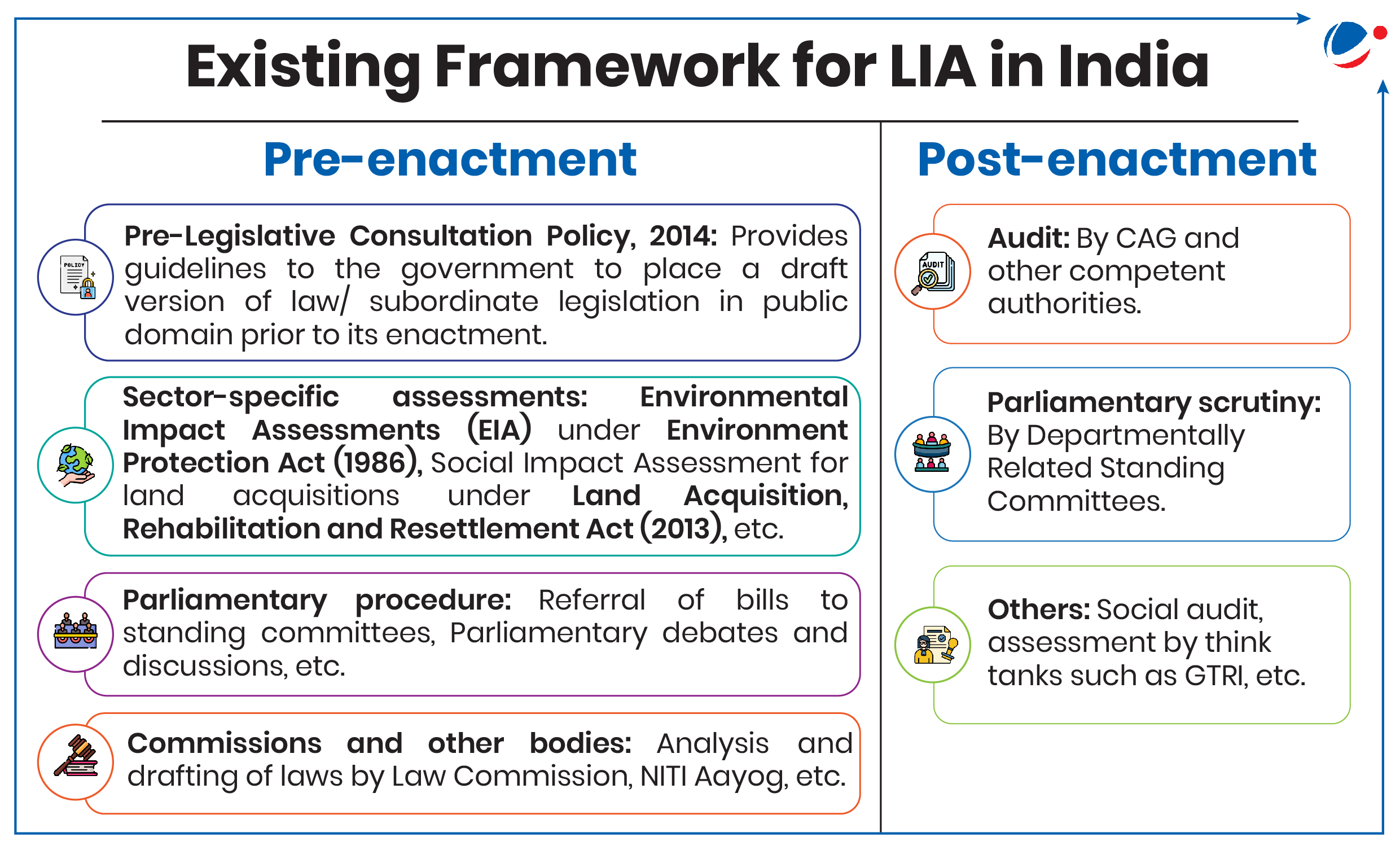Why in the News?
Recently, a 2-Judge bench of the Supreme Court suggested a comprehensive statutory audit of the Maharashtra Slum Areas Act and emphasized that reviewing and assessing implementation of a statute is an integral part of Rule of Law.
More on the News
- Court directive came in response to several systemic issues in implementation of the Act including problematic processes of land identification as slum areas, provision of accommodation for displaced slum dwellers, etc.
- It further emphasized that the executive branch has a constitutional duty to not just implement laws but also monitor it.
- Court's call for a comprehensive statutory audit highlights need for Legislative Impact Assessment as a systematic approach to evaluate the effectiveness and consequences of enacted laws
What is Legislative Impact Assessment (LIA)?
- LIA, also called Regulatory Impact Assessment, is a systematic method used to analyze the multidimensional impact of proposed and existing legislation, focusing on both positive and negative effects.
- Some of the essential components of LIA include problem identification, exploring choices, comparative analysis, stakeholder consultations, selection of preferred choice, socio economic analysis, post-enactment appraisal, etc.
What are the significances of LIA in India?
- Evidence-based Policymaking: Thorough assessments of legislations before and after enactment can allow policymakers to base their decisions on empirical evidence rather than assumptions or political pressures.
- LIA can help in optimizing resource allocation through effective cost-benefit analysis.
- Legislative quality: LIA can help prevent legal conflicts, ambiguities and enactment of cross-purpose and overlapping laws.
- e.g., overlap in jurisdictions of sectoral regulators (such as TRAI, SEBI, etc.) and Competition Commission of India (CCI) regarding anti-trust provisions.
- LIA can also help reduce burden on judiciary by reducing ambiguities in legislations, making stakeholder consultations and feedback mechanisms as alternative channels for resolving conflicts, anticipating legal challenges, etc.
- Scrutiny of delegated legislations: LIA can help assess whether the powers delegated to executive authorities are appropriate, well-defined, and being used as intended, given the reduced parliamentary scrutiny of delegated legislation.
- It can help reduce instances of malfeasance (intentional act of wrongdoing), misfeasance (commission of a lawful act in an improper manner), and nonfeasance (non-conformity to the law) by delegated authorities.
- Responsive and responsible Governance: LIA can provide scope for mid-term course correction and policy revisions to address implementation gaps effectively making the administration more responsive.
- Periodic assessments of legislative impact can increase transparency and hold lawmakers and implementing agencies accountable for the outcomes of their policies.
- Compliance with International Obligations: LIA helps ensure that new legislations/ policies align with India's obligations under various international agreements, including those related to human rights, trade, etc.
- e.g., in 2021, Merchandise Exports from India (MEIS) scheme was replaced by Remission of Duties or Taxes on Export Products (RoDTEP) scheme due to its non-compliance with WTO norms.

What are the challenges in ensuring effective LIA in India?
- Legal and institutional: There is an absence of formal and legally binding mandate for conducting LIA in India.
- Lack of effective inter-ministerial coordination and working in silos of government departments results in fragmented and incomplete assessments.
- Absence of dedicated institutions (like the UK's Better Regulation Executive) to ensure that every law undergoes impact analysis.
- Data limitations: Absence of comprehensive, reliable, and interoperable data on performance of statutes/ policies/ schemes make it difficult to conduct thorough assessments.
- Further, the concept of 'Bounded Rationality' can result in suboptimal analyses and flawed predictions about real-life performance of laws/ policies.
- Bounded rationality involves the idea that human decisions are not fully rational and bound by limitations of information failure, time taken for decision making, etc.
- Further, the concept of 'Bounded Rationality' can result in suboptimal analyses and flawed predictions about real-life performance of laws/ policies.
- Bureaucratic inertia: Procedure-oriented administrative culture designed on Weberian bureaucratic principles prioritizes following established procedures over introducing new, analytical practices.
- Further, closed bureaucratic system hinders effective coordination with stakeholders including civil society, policy think-tanks, etc.
What can be done to ensure effective LIA in India?
- Institutional: A dedicated agency or committee (on lines of UK's Better Regulation Executive) under the Ministry of Law and Justice or NITI Aayog could be set up to oversee and review the LIA process.
- Each statute creating a regulator should include a provision for an impact assessment periodically by an external agency. (ARC-II)
- Regulation Review Authority can be established for every regulatory authority, ministry or department to undertake the regulatory impact assessment, which should be a pre-condition to the writing of regulations. (Damodaran Committee, 2013)
- Legislative process reforms: Mandatory referral of bills to Departmentally Related Parliamentary Standing Committees for consideration and scrutiny. (NCRWC)
- Technology and Data-driven analysis: Leverage emerging technologies and tools such as data analytics, machine learning, and AI to significantly improve the accuracy and depth of LIAs.
- Strengthen government data collection system through digitization and democratize access to government data by ensuring effective implementation of initiatives such as National Data and Analytics Platform (NDAP).
- Capacity building and training: Collaboration with academic institutions, think tanks, and civil society in supplementing government's capacity by providing expertise and conducting independent assessments.
- e.g., Institutions like National Institute of Public Finance and Policy (NIPFP) can partner with government ministries to conduct specialized LIAs.




